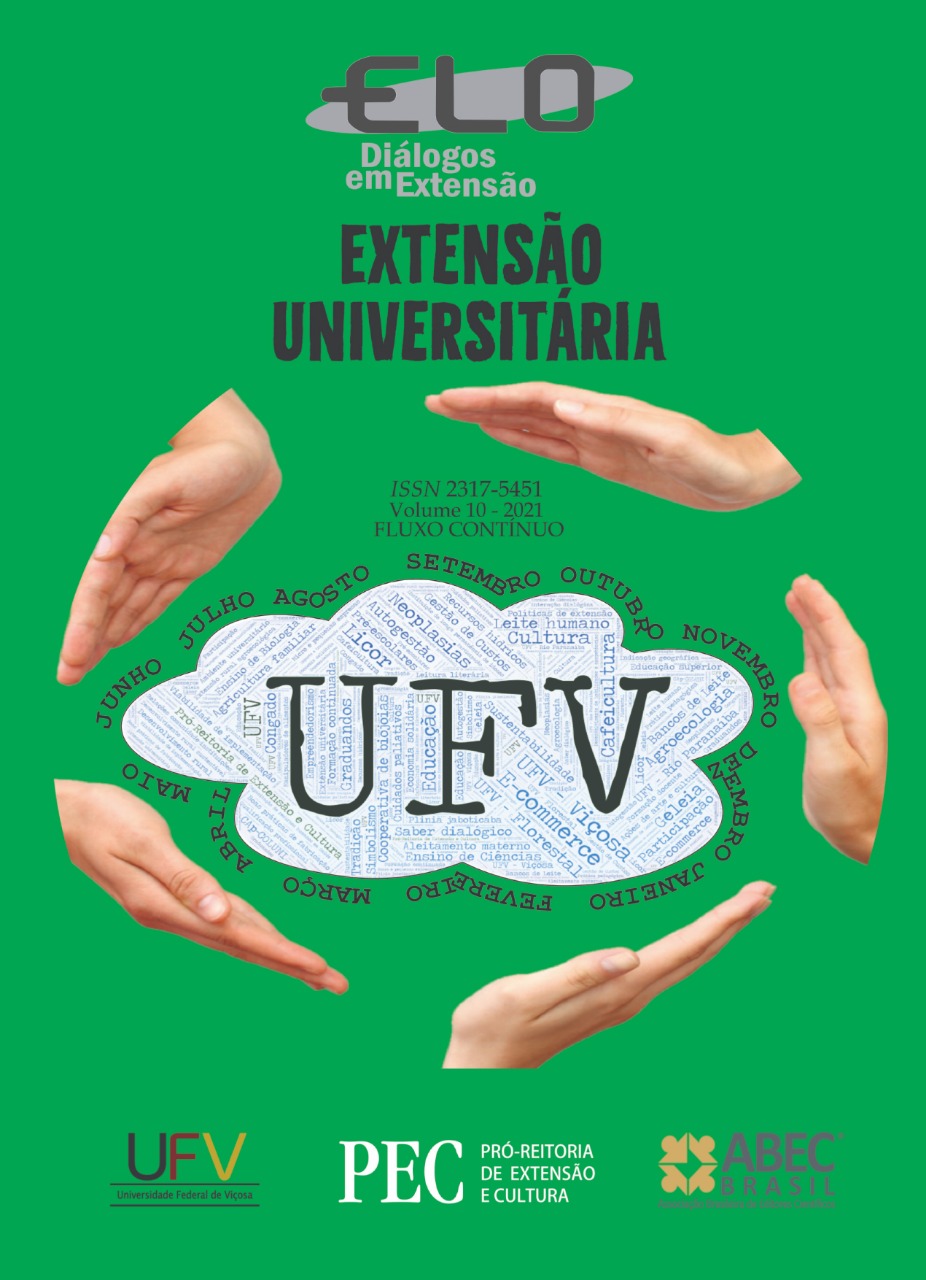Pertinence analysis´ of the theater of the oppressed for the extension university: perspectives of young people living in Crato, Ceará
DOI:
https://doi.org/10.21284/elo.v10i.11904Keywords:
University extension, Theater of the Oppressed, Peripheral neighborhoods, Right to the cityAbstract
This article aims to evaluate the relevance of the Theater of the Oppressed methodology for the promotion of university extension actions in peripheral-urban contexts through the analysis of the speeches of the young participants of Laurbs' extension actions in the Alto da Penha neighborhood, in Crato - CE. Through this, an exploratory survey was carried out, whose data was collected from a semi-structured questionnaire applied to young residents of the community. The qualitative data were treated by means of the content analysis technique, while the quantitative data were treated based on descriptive statistics. The results show that the participants see the relevance of the Theater of the Oppressed, evaluating it positively. It is concluded that playful methodologies as the Theater of the Oppressed are important to positively impact the awareness of young people about their territory and their roles in it, thus causing the awakening of social participation and citizenship.
Downloads
References
ABRAMO, Heleno Wendel. Considerações sobre a tematização social da juventude no Brasil. Rev. Bras. Educ., São Paulo, n. 5/6, p. 25-36, 1997.
BARDIN, Laurence. Análise de Conteúdo. Lisboa: Edições 70, 2002.
BENTO, Berenice. Transviad@s: gênero, sexualidade e direitos humanos. Salvador: EdUFBA, 2017.
BOGHOSSIAN, Cynthia Ozon; MINAYO, Maria Cecília de Souza. Revisão sistemática sobre juventude e participação nos últimos 10 anos. Saúde soc., São Paulo, v. 18, n. 3, p. 411-423, 2009.
BOAL, Augusto. Teatro do Oprimido e Outras Poéticas Políticas. 6. ed. Rio de Janeiro: EDITORA CIVILIZAÇÃO BRASILEIRA S.A., 1991.
BOAL, Augusto. A estética do oprimido. Rio de Janeiro: Garamond, 2009.
CHUECA, Eva Maria Garcia. O direito à cidade pode ser emancipatório?: Presenças, ausências e emergências na construção do direito à cidade no Brasil. 2018. Tese (Doutorado em Pós-colonialismos e Cidadania Global). Faculdade de Economia, Universidade de Coimbra, Coimbra, 2018.
CORRÊA, Roberto Lobato. O espaço urbano. São Paulo: Ática, Série Princípios, 1989.
DE PAULA, João Antônio. A extensão universitária: história, conceito e propostas. Interfaces - Revista de Extensão da UFMG, v. 1, n. 1, p. 5-23, 2013.
DAYRELL, Juarez. O jovem como sujeito social. Rev. Bras. Educ., Rio de Janeiro, n. 24, p. 40-52, 2003.
FIGUEIREDO, Angela. Carta de uma ex-mulata à Judith Butler. Revista Periódicus, v. 1, n. 3, p. 152-169, 2015.
FLORENTINO, Renata. Democracia Liberal: uma novidade já desbotada entre jovens. Opin. Pública, Campinas, v. 14, n. 1, p. 205-235, 2008.
FREIRE, Paulo. Pedagogia da Autonomia: saberes necessários à pratica educativa. 34. ed. São Paulo: Paz e Terra, 2006.
FREIRE, Paulo. Pedagogia do Oprimido. Rio de Janeiro: Editora Paz e Terra, 1987.
HARVEY, David. A produção capitalista do espaço. São Paulo: Anna Blume, 2005.
IBGE - Instituto Brasileiro de Geografia e Estatística. Censo de 2010. Disponível em: <http://www.censo(2010).ibge.gov.br/>. Acesso em: 14 Ago 2020.
INSTITUTO AUGUSTO BOAL. Vida e Obra de Augusto Boal. [2020]. Disponível em: <http://augustoboal.com.br/vida-e-obra/>. Acesso em: 29 Mai 2020.
LAKATOS, Eva Maria; MARCONI, Marina de Andrade. Metodologia do trabalho científico: procedimentos básicos, pesquisa bibliográfica, projeto e relatório, publicações e trabalhos científicos. 7. ed. São Paulo: Atlas, 2009.
MAGALDI, Sábato. Um palco brasileiro: o Arena de São Paulo. São Paulo: Brasiliense, 1984.
MARICATO, Erminia. A cidade sustentável. In: Congresso Nacional de Sindicato de Engenheiros, 9º. 2011.
MARICATO, Ermínia. Para entender a crise urbana. CaderNAU, v. 8, n. 1, p. 11-22, 2015.
MORETTIN, Luiz Gonzaga. Estatística básica: probabilidade e inferência. Volume único. Londres: Pearson Prentice Hall, 2010.
MOSTAÇO, Edélcio. Para uma história cultural do teatro. ArtCultura Uberlândia, v.20, n. 36, p.193-203, 2018.
OLIVEIRA, Francisco. Crítica à razão dualista: o ornitorrinco. São Paulo: Boitempo, 2003.
OLIVEIRA, Marcia Cristina Polacchini de. Arte em Cena: teatro na escola pública como prática de liberdade. 2014. Tese (Doutorado em Educação, Arte e História) - Universidade Presbiteriana Mackenzie, São Paulo, 2014.
PRIMO, Raimundo Edilglecio Correia. Cultura Sustentável: Protagonismo Comunitário, Desenvolvimento e Sustentabilidade no Alto da Penha em Crato-CE. 2018.Trabalho de Conclusão de Curso (Bacharelado em Administração Pública) - Universidade Federal do Cariri, Juazeiro do Norte, 2018.
PRODANOV, Cleber Cristiano; DE FREITAS, Ernani Cesar. Metodologia do trabalho científico: métodos e técnicas da pesquisa e do trabalho acadêmico. 2. ed. Novo Hamburgo: Editora Feevale, 2013.
SANTOS, Boaventura de Souza. Pela mão de Alice: o social e o político na pós-modernidade. 14. ed. São Paulo: Cortez, 2013.
SANTOS, Igor. Crise de representatividade e Neopopulismo: uma regressão aos direitos humanos. Revista Eletrônica Direito e Sociedade - REDES, v. 6, n. 1, p. 117-131, 2018.
SERRANO, Rosana Maria Souto Maior. Conceitos de extensão universitária: um diálogo com Paulo Freire. Grupo de Pesquisa em Extensão Popular, v. 13, n. 8, 2013.
Downloads
Published
How to Cite
Issue
Section
License
Copyright (c) 2021 Revista ELO – Diálogos em Extensão

This work is licensed under a Creative Commons Attribution 4.0 International License.
Authors who publish in this journal agree to the following terms:
A. Authors grant the journal the right of first publication, with the work simultaneously licensed under the Creative Commons Attribution License which allows the sharing of work with acknowledgment of authorship and initial publication in this journal.
B. Authors are authorized to take additional contracts separately, for non-exclusive distribution of the version of the work published in this journal (e.g. publish in institutional repository or as a book chapter), with acknowledgment of authorship and initial publication in this journal.
C. The journal holds the right to make format, orthographic and grammatical changes in the article to ensure the language standards, respecting the author’s style as well.
D. The opinions expressed by the authors are of their exclusive responsibility.















